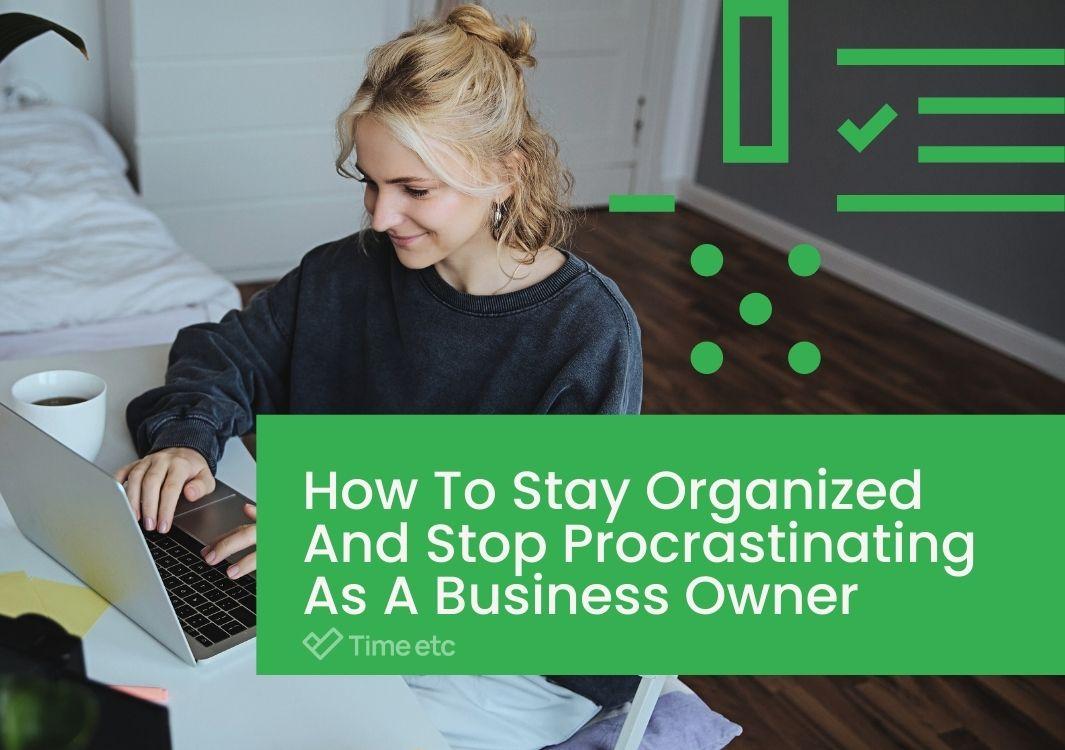It certainly isn’t easy to run your own business. In the morning, you might be focused on building your brand and spreading the word about what you do, and before you know it, you’re knee-deep in spreadsheets and invoices, trying to balance the numbers. You might shift from answering customer inquiries to handling supplier negotiations, all before lunch.
The list of responsibilities stretches endlessly, and instead of getting shorter, it often grows longer. The hours you invest quickly spill into evenings and weekends, and it becomes a constant juggling act to keep everything afloat.
And in that vulnerable space, a founder's arch-nemesis can strike. It doesn’t matter how much you love your craft or how committed you are to your industry. It doesn’t discriminate between those who are just starting out and those with years of experience. If you’re overworked, stretched too thin, or mentally drained, you become easy prey.
Writer Edward Young called it “the thief of time.” Businesswoman Barbara Corcoran called it “the enemy of success.” I’m talking, of course, about procrastination—the silent saboteur of progress.
Learning to recognize it, understand it, and having strategies in place to fight it is just as critical for founders as building a marketing plan or balancing the budget. Because while passion and hard work can carry you far, procrastination has the power to quietly undo everything you’re striving for.
Why do we procrastinate?
Even the most productive, detail-oriented, and disciplined people put things off from time to time. It doesn’t mean you’re lazy. It doesn’t mean you don’t care about your work. The answer lies deep in the hard-wiring of every human brain.
Neuroscientists have explained procrastination as the result of a battle between two areas of the brain when faced with “boring” tasks:
- The prefrontal cortex, which is responsible for planning, predicting, and personality development.
- The limbic system (also referred to as your “lizard brain”), which is responsible for your survival instincts, the fight or flight response, and pleasure-seeking.
When you’re growing a business, this internal battle plays out constantly. There could be many areas in which you need to work, but not all tasks may feel as worthwhile as others.
For example, you might love sitting down and planning ideas for strategies, but the thought of admin jobs fills you with dread. Your prefrontal cortex knows that completing admin tasks is important, but it is much newer (and weaker) than the limbic system, which is far from thrilled at the prospect of doing something it doesn’t enjoy. This is when you’ll find yourself saying “I’ll do it later/tomorrow/next week”.
But inevitably, “later/tomorrow/next week” can end up further and further away, and tasks piling up can lead to working increasingly long hours in an attempt to get everything done, or feelings of stress, anxiety, or guilt at not keeping on top of everything.
The danger is that “later” often never comes. Tasks pile up, deadlines creep closer, and suddenly the day stretches longer and longer as you scramble to catch up. Stress levels rise, guilt sets in, and the joy of building your business gets clouded by overwhelm.

Five ways to beat procrastination
Procrastination is a universal challenge, but it doesn’t have to control your working life.
These are practical, proven strategies you can start using today to break the cycle and take back control of your time.
1. Catch yourself in the act
Beating the habits of millions of lifetimes (thanks to human evolution) will undoubtedly seem much easier said than done when it comes to overcoming the actions of the limbic system. But the simplest way is arguably one of the most effective: self-awareness.
Other than being older and stronger, the main reason why the limbic system tends to win over the prefrontal cortex is that all its actions and reactions are automatic. For example, when you touch something hot, you don’t have to think about moving your hand away. In the same way, sometimes we don’t even realize we’re procrastinating until we’re already scrolling social media, refreshing our inbox for the tenth time, or deciding now is the perfect moment to tidy our desk.
So, the key is to interrupt this automatic process by learning to recognize it as it happens. Pay attention to the moments when you find yourself avoiding a task. Do you suddenly feel the urge to make another coffee before diving in? Are you scrolling through your notifications under the guise of “just a quick check”? These are classic signs of the limbic system steering you toward comfort instead of productivity.
The moment you notice yourself reaching for distractions, pause. This interrupts that automatic loop and creates a small but crucial space between impulse and action. In that space, you can make a choice: continue giving in to procrastination, or redirect your focus back to the task that will move you forward.
Becoming more mindful of your own behavior doesn’t just help you spot procrastination sooner; it also makes its impact harder to ignore. When you pause and recognize, “I’m putting this off again,” you begin to see the real cost. You see how much time slips away, how energy is wasted, and how momentum is lost. That realization alone can often spark the motivation to course-correct in the moment.
Awareness doesn’t eliminate procrastination overnight, but it weakens its grip. Each time you catch yourself in the act, you strengthen the prefrontal cortex’s influence, making it easier to overrule the limbic system the next time.

2. Less is more
One of the most underrated skills in overcoming procrastination is learning how to prioritize tasks effectively. Knowing what not to do can be just as powerful as deciding what deserves your time and attention for the day.
Many of us are familiar with the creative struggles of “blank page syndrome” for writers or “blank canvas paralysis” for artists, where an empty page can be so daunting that it feels impossible to know how to begin. But in business, the opposite problem can be just as overwhelming! Staring at a page filled with twenty, thirty, or even more items can be enough to paralyze you before you even begin.
The danger of overloading your to-do list is that you set yourself up to fail. If you try to tackle ten or twelve priorities in a single day, chances are high that you won’t complete them all. The unfinished tasks roll over to the next day, piling on top of new responsibilities.
Before long, you’re in a cycle where you’re constantly chasing yesterday’s work, feeling behind no matter how many hours you put in. That sense of always being “on the back foot” breeds procrastination, because when you feel like you’ll never catch up, why even start?
The antidote is simple: downsize your task list. Instead of trying to tackle everything, handpick a small number of jobs that you must finish by the end of the day. Three to five is usually the sweet spot. This approach forces you to be intentional about where your energy goes and reduces that overwhelming sense of “too much to do.”
A helpful technique is impact scoring. Look at each task and ask yourself:
- How time-sensitive is this?
- What impact will completing this have on my business, my clients, or my long-term goals?
Using these two measures, order your list from "most important tasks" to "least important".
When you focus on fewer but higher-impact tasks each day, the pressure eases, progress feels faster, and procrastination has less room to take hold. And when you do manage to squeeze in additional tasks beyond your top priorities, it feels like a bonus win, rather than a desperate attempt to catch up.
And often, procrastination doesn’t stem from an unwillingness to work, but from being unsure where to begin. Many small business owners find visual prioritization helpful for optimizing their to-do list even further to keep them on track. For example, highlight your top task in a bold color so your eyes are immediately drawn to it. Once it’s done, highlight the next one. This way, you always know instantly what it is you should be working on whenever you glance at your list.
See: Why You Should Write A "Stop-Doing" List Instead Of A To-Do List

3. Batch your tasks for better flow
One of the biggest productivity drains for small business owners isn’t the work itself—it’s constantly switching between different types of work. Every time you move from answering emails to brainstorming marketing ideas, then back to processing invoices, your brain needs to reset. That constant back-and-forth creates what researchers call "context-switching," and studies suggest that these mental interruptions can steal up to 40% of your productive time.
But it doesn’t just waste time. Those little mental roadblocks also open the door to procrastination. Each time you stop to reorient yourself, the limbic system looks for an easy escape: “I’ll check my phone first,” or “I’ll do this later when I have more energy.” Before you know it, a five-minute pause turns into half an hour, and momentum is lost.
At the end of your week, take a few minutes to write down everything you know you’ll need to do in the coming days. Then group similar tasks together—emails in one cluster, financial admin in another, marketing work in its own batch, and so on.
When you begin your new week, you’ll already know which tasks belong together. Instead of bouncing between unrelated to-dos, you can dedicate uninterrupted blocks of time to a single category or batch. This helps your brain stay in one “mode” for longer stretches, which helps you stay focused, avoid procrastination, and keep momentum going.
A batched day might look something like this:
- Morning block: Start with email, clearing your inbox and responding to important messages.
- Late morning block: Move into admin—processing invoices, updating spreadsheets, placing orders, and tying up those operational details.
- Afternoon block: Focus on marketing—drafting your newsletter, scheduling social media posts, replying to comments, and creating content.
See: 5 Essential Reasons To Stop Multitasking And Start Monotasking Today

4. Bribe yourself (in the best way possible)
At its core, procrastination is often less about discipline and more about motivation. Or rather, the lack of it.
At the heart of motivation lies dopamine, a neurotransmitter that fuels feelings of pleasure, reward, and satisfaction. The happiness you feel when hugging your loved ones? The satisfaction you feel from eating your favorite food? That’s dopamine at work, and it’s created in the limbic system—the same part of your brain that tempts you into procrastination.
This connection is important because procrastination often thrives in the absence of reward. If a task feels dull, repetitive, or unrewarding, your brain doesn’t release dopamine, which makes it harder to stay motivated. That’s why certain responsibilities, like filing expenses, updating spreadsheets, or tackling overdue admin, are the first ones we push aside. They don’t make us feel good in the moment, so our brains naturally look for an escape.
But here’s the good news: you can hack this system. If a task doesn’t naturally provide a dopamine reward, you can create one. The trick is to pair a task you tend to procrastinate on with an immediate reward that reliably triggers dopamine.
For example, you could:
- Promise yourself a fresh cup of coffee or tea right after finishing an invoice.
- Step outside for a short walk once you’ve cleared your inbox.
- Listen to your favorite playlist after updating your financial records.
- Watch a quick video or read a chapter of a book once you’ve scheduled your social posts.
The key is that the reward follows immediately after the task is completed, so your brain begins to connect the effort with the feel-good payoff. Over time, this conditioning helps dull tasks feel less intimidating because your limbic system learns there’s something enjoyable waiting on the other side.
You can also flip this strategy around by combining rewards with the task itself. For instance, if you dread certain admin work, try doing it at your favorite café or while listening to music that boosts your mood.
These dopamine rewards don’t have to be extravagant. Small, consistent pleasures are often the most effective. The important thing is that you choose something that feels genuinely enjoyable to you, so your brain learns to anticipate the payoff. Before long, you’ll find it easier to approach those once-daunting tasks with less hesitation and more momentum.

5. Hire a virtual assistant (VA)
Dopamine rewards can help you power through tasks you’d normally put off, but sometimes, it's not focus or motivation that's the main issue.
As your business grows, so do the demands on your time, and no amount of clever productivity hacks can change the fact that there are only twenty-four hours in a day. The reality is, you can’t keep adding more and more to your plate without consequence. Eventually, something has to give.
At this stage, this isn’t just putting off the boring jobs. This is facing a workload so heavy that deadlines get missed, details fall through the cracks, and you find yourself too drained to give your best effort where it truly matters. Your relationships feel the strain, too, and your mental health takes a nosedive.
This is where a virtual assistant can be worth their weight in gold.
Think of all the things you have to do on a daily or weekly basis: processing invoices, responding to routine emails, scheduling meetings, managing your inbox, uploading content, posting to social media, tracking expenses. These are the kinds of jobs that are absolutely necessary for a business to run, but is it absolutely necessary for you—the head of your business—to be the one who does them?
Not at all.
They can easily be handed off to someone skilled and reliable, and a VA offers a simple, cost-effective, and highly flexible way to complete tasks without the financial commitment of a full-time employee.
And the benefits of virtual assistants extend far beyond productivity. They provide the breathing room you desperately need, giving you the confidence that tasks are handled even if you step away for an afternoon, a weekend, or even a vacation. That peace of mind creates space to recharge, to show up more fully for your family and friends, and to protect your mental well-being without sacrificing your business.
In the end, hiring a virtual assistant isn’t about admitting you can’t do it all. It’s about recognizing that you shouldn’t have to.
See: When Is It The Right Time To Hire Admin Support As A Founder?
What's the bottom line?
Overcoming procrastination isn’t about becoming superhuman. It’s about working with your brain, not against it, and setting up simple systems that make progress easier than avoidance.
Start small: catch yourself in the act before procrastination takes hold, and learn to prioritize the tasks that truly matter instead of drowning in endless lists. Batch your work to cut down on energy-draining context switching, and use dopamine rewards to give yourself that extra push when motivation runs low.
Procrastination often flourishes when you’re overwhelmed and overworked, so when the demands of your business begin to spill over into your health and personal life, remember that you don’t have to do it all alone.
Want to do more of the work that matters most?
Time etc has got your back.
We help founders like you step out of the stress and back into the driver’s seat of their business. We match you with skilled, experienced virtual assistants to take care of all the work that's holding you back.
No more endless to-do lists. No more guilt about putting things off. Just the breathing room you need to show up as your best self for your business, your family, and your life.
Here's a glimpse of what you can expect with Time etc:
- Access to our thoroughly screened and vetted talent pool of over 700 assistants.
- A dedicated assistant matched to your unique needs, ready to start in days—not weeks.
- All hiring and HR handled for you, so you stay focused.
- Flexible, scalable support that grows with your business.
- Up to 90% lower hiring costs than traditional recruitment.
Ready to get started?
All you need to do is tell us what you need—and we’ll take care of the rest.
P.S. Want $150 off your first month of VA support? Just answer a few quick questions to get personalized task recommendations and unlock your welcome discount!












